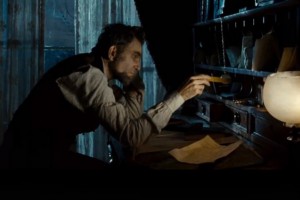This is the third in a weekly series of posts connecting Spielberg’s Lincoln to President Lincoln’s Cottage.
(Photo courtesy of Dreamworks)
“So did any of the movie, Lincoln, take place at Lincoln’s Cottage?,” people ask.
“No,” we reply, “the film covers the months of December, 1864/January, 1865, and the Lincolns weren’t here during those months.”
However, that doesn’t mean little of significance took place regarding the 13th Amendment to the Constitution at this place. In fact, there’s evidence that Lincoln had the 13th Amendment on his mind a good bit of the time the family was here in 1864. Knowing that the 13th Amendment had passed the Senate on April 6th of 1864, Lincoln was determined that it should be part of the Republican Platform in the 1864 election. He insisted on its inclusion, knowing that it could be problematic. In the summer of 1864 when the family was at the Cottage, the Republican National Party Chairman predicted Lincoln’s defeat in the election based on his position to make slavery unconstitutional and the fact that there had been few Union victories. But Lincoln was totally committed. When pressed by a former Wisconsin governor to respond to a Wisconsin editorial in which the writer threatened not to support Lincoln in 1864 because of the 13th Amendment, Lincoln drafted a response. According to Frederick Douglass, however, the response wasn’t clear in its anti-slavery position, and Lincoln never sent the letter. Also, in August/September Lincoln was working on a public letter to be read on September 3rd in Illinois by James Conkling. The letter was to be read at a meeting organized to rally support by Unionists against Copperheads in the Northwest. In the letter Lincoln said, “But to be plain, you are dissatisfied with me about the negro … You dislike the emancipation proclamation; and, perhaps, would have it retracted. … it can not be retracted, any more than the dead can be brought to life … the promise being made, must be kept.” Also, late in the summer of 1864, Lincoln addressed the Baltimore Sanitation Commission. In that speech, he created a parable which illustrated the moral imperative that government take care of the entire population of the nation, both black and white.
There’s evidence, too, that Lincoln was totally comfortable with his decision on the 13th Amendment. On October 17th an Englishman visited Lincoln at the Cottage and found a man who explained how he’d risen from poverty, believing all men should have the same opportunity!
So, though the events of the film Lincoln don’t happen here at Lincoln Cottage, many events surrounding the 13th amendment and its passage did.
-Beth Roberts, Interpreter at President Lincoln’s Cottage

